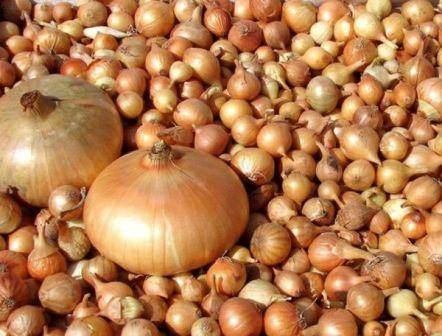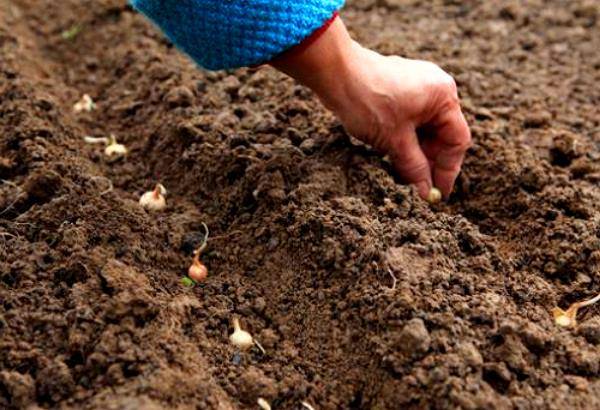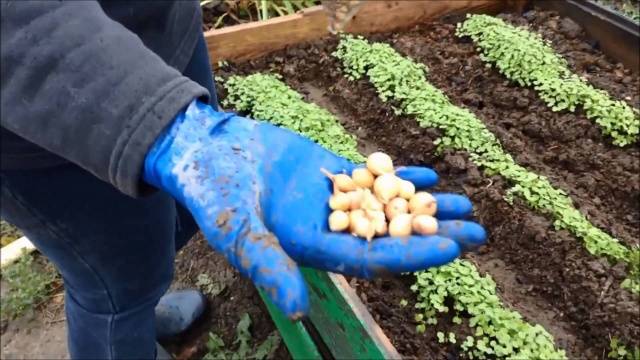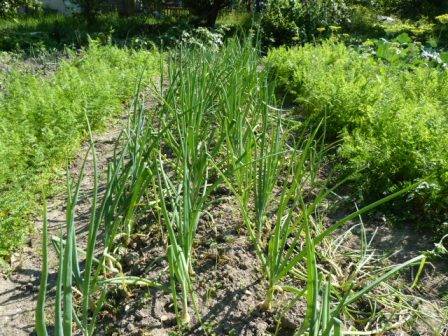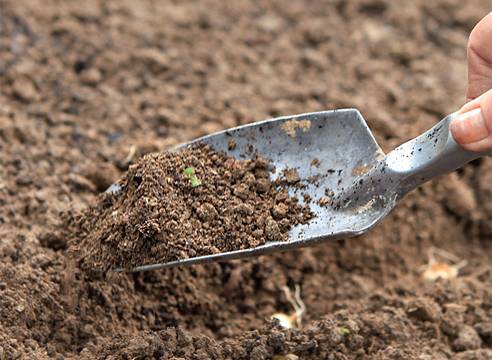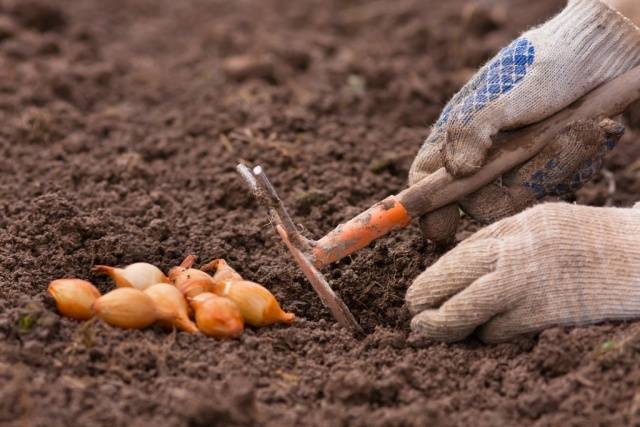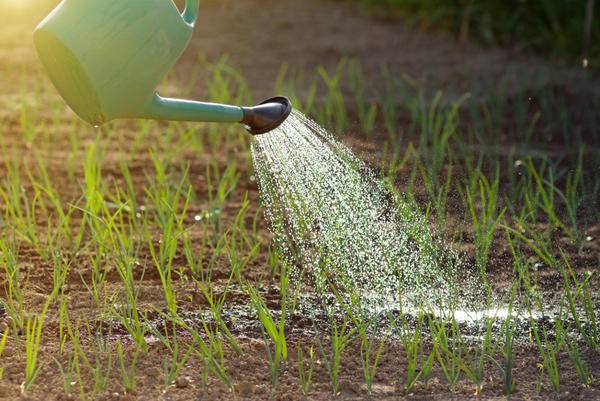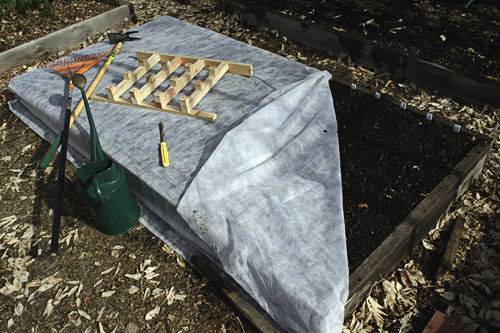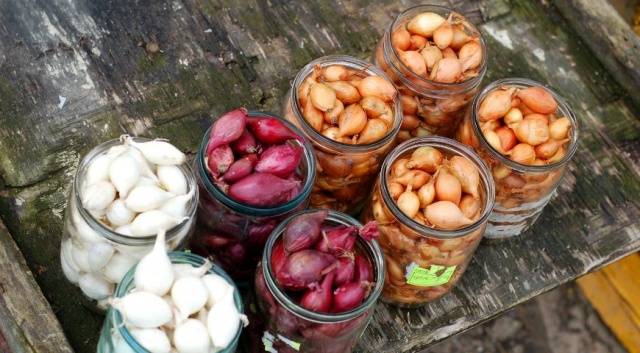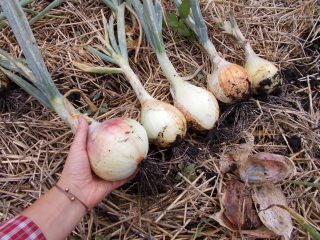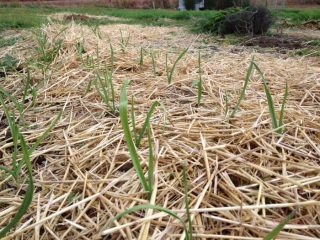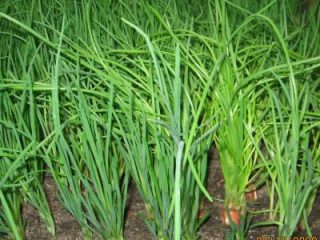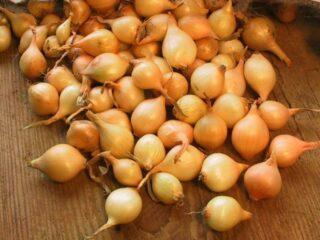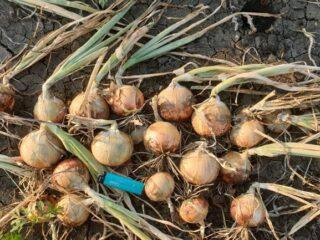Content
Onions are grown by almost all gardeners. Many face the same problem. The bulbs often go into the arrowhead, which affects the yield. Some decided to grow sets for planting on their own. However, this is too troublesome business. In addition, if the seed is stored incorrectly, then the bulbs will bloom anyway and will not give the desired yield. Based on this, some gardeners decided to plant onions in the beds before winter. This method is in great demand as it gives excellent results. In this article, we will look at all the benefits of such a fit and learn how to plant onions before the winter.
Benefits of planting before winter
Everyone knows that the best onion grows from small oatmeal. Such bulbs (no more than a centimeter in diameter) can be purchased inexpensively in any market. Such seed is stored poorly. If you plant plants in the spring, then most often the onions begin to bloom. Autumn planting in this case is the best option.
Planting material classification:
- "Wild oat" - onions with a diameter of no more than 1 cm;
- "Samples" - larger bulbs, up to 3 cm;
- the first category - from 1 to 1.5 centimeters;
- the second category - the diameter of the bulbs is from 1.5 to 3 centimeters.
Samples are most often used for growing green onions. But oatmeal is perfect for planting in late autumn. Onions are planted densely, you can nest in 3 or 4 pieces. This way, even if not all of the bulbs will sprout, you can still get a bountiful harvest. In the spring, plants can be thinned out as needed.
The advantages of this method also include a fairly early harvest. Usually ripe vegetables are harvested in July. Thanks to this, a lot of space will be freed up in the beds and it will be possible to sow your favorite greens or some early ripening vegetables.
Onions planted in autumn sprout faster weeds... When it comes to weeding the garden bed, you will not be afraid to touch delicate plants. They will already grow up well and become noticeable. Together with unwanted vegetation, they definitely cannot be pulled out.
For commercial purposes, it is much more profitable to plant onions just before winter. Early vegetables are usually much more expensive than those sold during mass harvest. Such a crop is stored much better, since it is healthier and stronger than onions planted in spring. In addition, a huge number of plants have to be planted in spring. So the autumn planting will greatly save your time and effort.
When to plant seed
As you know, you can plant onions in the beds both in autumn and spring. True, the first method, for some reason, was not in great demand before. Residents of Siberia, the Urals and the Moscow region are most worried about whether it is worth planting onions for the winter... Indeed, not every variety tolerates wintering well, especially in cold climates. Fortunately, many winter varieties have been developed to date. They feel great in the ground throughout the winter. Let's find out when to plant onions before the winter.
Planting onions before winter is carried out, focusing on the climatic conditions of your region. In warm areas, onions are planted until November. Usually the seedlings are planted towards the end of October. In colder regions, planting is carried out even before mid-October.Since autumn was cold in 2017, you can plant the set a little earlier than usual.
Finding the perfect time to plant is very important. By cold weather, the onion should take root in a new place and take root. If the seed is planted too early, the plant may germinate and freeze. But this does not mean that it is better to plant the bulbs before the frosts themselves. In this case, the plant simply will not have time to take root and, most likely, will freeze. Some gardeners believe that it is best to plant towards the end of November. But if in warm regions this is somehow justified, then in Siberia you just have to hope for luck.
What culture will the onion grow best?
Some gardeners do not attach much importance to crop rotation. However, alternating vegetable crops can significantly affect yields. Onions grow well after crops (not counting oats). Cucumbers, tomatoes, beets, cabbage, peas, canola, beans and carrots are also good predecessors.
What about the bow itself? Many people wonder if it is possible to plant it in the same garden for several years in a row. For more than two years, this crop should not grow in one place. After onions and garlic, the earth should rest for four years. At this time, you can grow vegetables from the list above on it. By the way, after such crops, you can get a second harvest of onions. At the same time, it must be planted before the end of July, otherwise it will not be possible to harvest a good harvest.
Preparing onions for planting
At this stage, you should determine for what purpose the plant is grown. To obtain high-quality greenery, a sample is taken (up to 3 cm in diameter). Such a large onion is likely to go into the arrow, so it is used only for growing greens. To obtain large fruits, take the smallest bulbs. It is this seed that will allow you to grow turnip onions.
Some gardeners grow several types of onions at once. In this case, you will have to sort the seed. In this case, you should not cut off the neck of the fetus. Wild oat and set are great for planting in the autumn season. Over the winter, such fruits can simply dry out and become unusable. Therefore, plants are planted in the fall.
Soil preparation
Autumn planting of onions will be successful only with the right site selection. The soil for growing plants should be light and fertile. Purulent-sandy drained soil is ideal. The location of the site is equally important. It should be on the south or southwest side. It is advisable that there are plants on the site that will protect the onions from the north wind.
When preparing the soil, you should dig up a bed with the addition of humus and mineral fertilizers. Per square meter of the site, you will need about five or six kilograms of humus, up to 15 grams of potassium salt and no more than 25 grams of superphosphate. You can replace these minerals with a ready-made eco-foam. Directly before boarding seed the soil should be sprinkled with wood ash. To do this, take about 10 grams of ash per square meter of the garden.
How to plant winter onions
Planting onions in the fall is no more difficult than planting in the spring season:
- First you need to loosen and level the soil in the garden with a rake.
- Then furrows are made in the soil five centimeters deep at a distance of up to 20 centimeters.
- Sevok must be dry. Prepared bulbs are laid out in furrows at a distance of 5 to 7 centimeters from each other.
- Furrows are covered with dry soil and tamped a little.
- Most often, the garden is not watered at all.But if it does not rain for 10 days after planting, then it will be possible to slightly moisten the ground.
- After the onset of frost, the bed is sprinkled with dry leaves, needles or spruce branches. It is advisable to cover the leaves with branches from above, otherwise they will simply be blown away by the wind.
- In regions with cold winters without snow, you can build an additional cover for the bed from the film.
Winter onion care
Caring for this plant is quite simple and quick. The first step is to remove the film from the garden. This is done as soon as the soil begins to warm up in the spring. After seven days, the mulch will also dry out. This means that leaves and branches can be removed from the garden. Then you need to sprinkle the soil with wood ash and slightly loosen the top layer of the earth. Ash is taken at the rate of ten grams per square meter of land.
The shelter must be removed as soon as it gets warmer. If tightened, the seedlings can get wet and the mulch will prevent the sprouts from sprouting. Further care mainly consists of loosening the soil and weeding. This should be done after every rain. If there is no rain for a long time, it is necessary to water the plants, after which the soil must be loosened.
Before feeding, it is necessary to thin out the seedlings as needed. Plucked young onions can be used for food. As a fertilizer for plants, take superphosphate (up to 20 grams) and potassium (up to 15 grams) per square meter. All this, together with ash, is dissolved in an herbal infusion. Organic lovers can use liquid chicken manure to feed plants.
If the spring is rainy, then there is no need to water the beds. They do this in dry times and no more than once a week. The main pest in this case is the onion fly. To protect the garden from it, calendula or marigolds should be planted around the site. The scent of these plants will scare away the fly and thereby protect the future harvest.
When to plant winter onions in different regions
The timing of planting and care largely depends on the area. Let's look at how onions are planted in different regions:
- In the Moscow region, sevok is planted in the usual way until the end of October. Planting and caring for plants is also practically the same. The only thing that can hinder the development of plants is a cold winter. Temperatures below -15 ° C can be fatal for this culture. In this case, you will have to cover the bed with plastic wrap. This will reliably protect the planting from freezing. But if the cold winter is accompanied by a lot of snow, then nothing threatens the beds. A snowdrift keeps warm well and prevents the onion from freezing.
- But in the Urals, the main care and planting of the sevka may differ slightly from the usual method. In this case, they try to plant the plants in the beds before the end of September. If the autumn is warm, then the planting period can be extended until mid-October. Here you no longer have to choose whether to cover the garden or not. Shelter must be built without fail. It must also be remembered that only hardy winter-hardy onion varieties can grow in the Urals.
- In Siberia it is difficult to guess the timing of planting. Severe frosts can ruin all efforts. Planting onions in the fall before winter is in this case possible, but only if certain conditions are met. You will have to choose the most hardy varieties, plant the sets on time before the onset of cold weather and be sure to build a reliable shelter. Then it all depends on luck. Otherwise, it will be better to plant onions in the spring.
Suitable winter varieties
Planting winter onions in the fall will be successful only if you choose the right varieties for growing.So, the following varieties are suitable for planting winter onions:
- "Ruby";
- "Robin";
- "Mouzon";
- "Buran";
- "Siberian one-year";
- "Black Prince";
- "Tamara F1".
Conclusion
As we have seen, there are many benefits to planting onions during the winter. Thus, large onions can be grown much earlier than grown in spring. The advantages of winter planting can also be attributed to saving time in the spring. We also learned when to plant onions before winter. We saw what predecessors of onions contribute to good growth and development of fruits. Now that you know how to properly plant onions in the fall, you can safely get down to business. We are confident that your work will be crowned with success.
